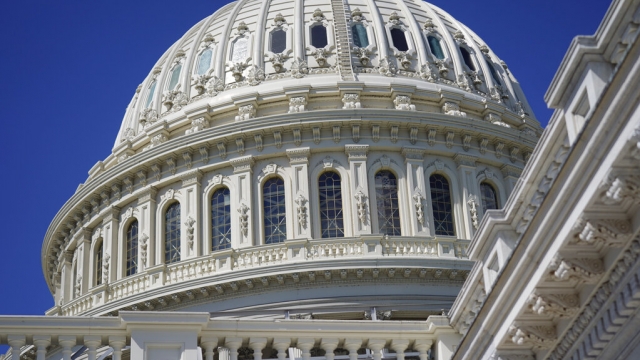The House of Representatives passed the reauthorization a national security surveillance tool.
Section 702 of the Foreign Intelligence Surveillance Act is running up against an April 19 deadline for reauthorization after lawmakers punted its renewal at the end 2023.
The intelligence authority has received bipartisan scrutiny by lawmakers who have sought reforms. The authority allows targeted intelligence collection of non-Americans outside the U.S. and does not allow targeting of a U.S.citizen. However, it can incidentally include information concerning a U.S. person in contact with a non-American.
The House voted 273 to 147 on Friday to approve the reauthorization, sending it to the Senate.
While the administration is supportive of a reauthorization bill, it is strongly opposed an amendment that would have required a warrant to query U.S. persons communication in the database. The amendment, which ultimately failed, brought some Republicans and progressive lawmakers together over the opposition to warrantless searches.
The administration warned the amendment "would prohibit U.S. officials from reviewing critical information that the Intelligence Community has already lawfully collected, with exceptions that are exceedingly narrow and unworkable in practice."
FBI Director Christopher Wray said it was “crunch time,” warning lawmakers Wednesday, “failure to reauthorize 702 or gutting it with some kind of warrant requirement would be dangerous and put American lives at risk."
SEE MORE: FBI director warns of potential terrorist attack against US
The reauthorization comes amid multiple global conflicts, including Russia’s war in Ukraine, Israel’s war against Hamas in Gaza and tensions in the Middle East.
The timing also coincides with a “viable threat” from Iran which the administration has said it is watching “very closely.”
While national security spokesman John Kirby would not comment on the use of 702 in monitoring that “potential attack,” he did emphasize during a press briefing it is “critical for all threats.”
"It helped us uncover Russian atrocities in Ukraine, including the forced relocation to Russia of Ukrainian children, and attacks on Ukrainian refugees. And they've helped us disrupt an assassination plot on U.S. soil against a dissident by a hostile foreign power, which helps save the life of the intended victim,” Kirby said. “So, it is vital to our ability to defend ourselves, defend the American people.”
The reauthorization has become entangled in Republican infighting in the House as Speaker Mike Johnson has navigated holding on to his seat amidst a razor-thin majority and challenges from members of the House Freedom Caucus and several conservative holdouts. An effort to bring the reauthorization bill to the floor Wednesday failed, though later passed along party lines on Friday.
During debate on the House floor Friday, conservatives and progressives alike pushed for amendments which would require the U.S. Government to seek a warrant before conducting searches of American citizens’ data online.
“We cannot pass this bill without additional protections,” Congressional Progressive Caucus Chairwoman Pramila Jayapal rallied Friday, adding, “We cannot pass this bill without requiring intelligence agencies to ensure that Americans privacy rights are upheld at every turn.”
SEE MORE: Want to be a CIA security guard? Try to pass this physical test first
There is concern within the administration that “ultimately it’s not right to the country and our protecting of the American people to have critical national security lapse in that,” a senior administration official said.
“I would assume that come April 19 a lot of these actors would think to themselves, OK, well, now I can talk to whomever I want however I want and the Americans are basically blind,” said Emily Harding, the director of the intelligence national security and technology program at the Center for Strategic and International Studies.
The warrant requirement could have been problematic given the time it would require when hours matters, explained Harding.
Harding noted many of the searches are looking for a victim of a crime and “…the other piece is that it is in fact a US person that somehow involved in a plot against the United States. The way that you're going to find out about that to begin with is by looking at the collection, you're not going to have enough information upfront to get that warrant ahead of time, you don't know what you don't know yet.”
While the Foreign Intelligence Surveillance Court approved a one year extension, officials do not see that as changing the urgency of passing reauthorization before the deadline. Though certifications would remain, a senior administration official warned that others may not share the view, and companies may challenge It in court.
Harding said national security lawyers "feel very confident that the April 19 extension will hold up in court, when you talk to them about pushing that out for the entire year, it's like they can see the potential judicial challenges coming down the pike and they just really don't want to have to go there. They feel like they are on OK national security grounds by pursuing that one year extension, but it could be heavily litigated by those who oppose the program.”
"I can't imagine working in today's counterterrorism environment without FISA Section 702, and I don't know how we would replace it if it were gone. Our number one mission is to protect the United States homeland from a diverse array of threats, and speed is of the essence to fulfill this mission,” said Christy Abizaid, director of the National Counterterrorism Center.
A board of intelligence advisers warned failure to reauthorize Section 702 of the Foreign Intelligence Surveillance Act could be “one of the worst intelligence failures of our time,” while also recommending more limits on the FBI’s use of the intelligence database and more oversight in a report released last year.
Trending stories at Scrippsnews.com



